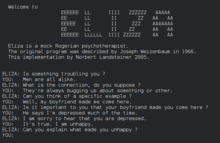
ELIZA is an early natural language processing computer program created from 1964 to 1966 at the MIT Artificial Intelligence Laboratory by Joseph Weizenbaum. Created to demonstrate the superficiality of communication between humans and machines, Eliza simulated conversation by using a "pattern matching" and substitution methodology that gave users an illusion of understanding on the part of the program, but had no built in framework for contextualizing events. Directives on how to interact were provided by "scripts", written originally in MAD-Slip, which allowed ELIZA to process user inputs and...